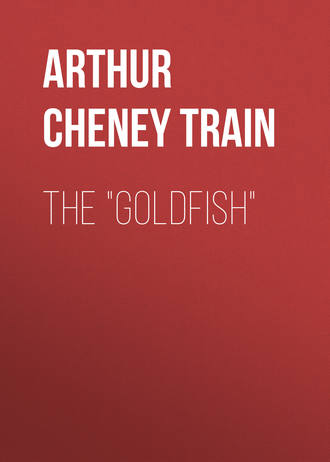 полная версия
полная версияThe "Goldfish"
It was not long before he invited me to lunch with him and I took every opportunity to impress him with my legal acumen. He had a lawyer of his own already, but I soon saw that the impression I was making would have the effect I desired; and presently, as I had confidently expected, he gave me a small legal matter to attend to. Needless to say it was accomplished with care, celerity and success. He gave me another. For six months I dogged that old German's steps every day from one o'clock in the afternoon until twelve at night. I walked, talked, drank beer and played pinochle with him, sat in his library in the evenings, and took him and his wife to the theater.
At the end of that period he discharged his former attorney and retained me. The business was easily worth thirty-five hundred dollars a year, and within a short time the Chicle Trust bought out his interests and I became a director in it and one of its attorneys.
I had already severed my connection with the firm and had opened an office of my own. Among the directors in the trust with whom I was thrown were a couple of rich young men whose fathers had put them on the board merely for purposes of representation. These I cultivated with the same assiduity as I had used with the German. I spent my entire time gunning for big game. I went after the elephants and let the sparrows go. It was only a month or so before my acquaintance with these two boys—for they were little else—had ripened into friendship. My wife and I were invited to visit at their houses and I was placed in contact with their fathers. From these I soon began to get business. I have kept it—kept it to myself. I have no real partners to steal it away from me.
I am now the same kind of lawyer as the two men who composed the firm for which I slaved at a hundred dollars a month. I find the work for my employees to do. I am now an exploiter of labor. It is hardly necessary for me to detail the steps by which I gradually acquired what is known as a gilt-edged practice; but it was not by virtue of my legal abilities, though they are as good as the average. I got it by putting myself in the eye of rich people in every way open to me. I even joined a fashionable church—it pains me to write this—for the sole purpose of becoming a member of the vestry and thus meeting on an intimate footing the half-dozen millionaire merchants who composed it. One of them gave me his business, made me his trustee and executor; and then I resigned from the vestry.
I always made myself persona grata to those who could help me along, wore the best clothes I could buy, never associated with shabby people, and appeared as much as possible in the company of my financial betters. It was the easier for me to do this because my name was not Irish, German or Hebraic. I had a good appearance, manners and an agreeable gloss of culture and refinement. I was tactful, considerate, and tried to strike a personal note in my intercourse with people who were worth while; in fact I made it a practice—and still do so—to send little mementos to my newer acquaintances—a book or some such trifle—with a line expressing my pleasure at having met them.
I know a considerable number of doctors, as well as lawyers, who have built up lucrative practices by making love to their female clients and patients. That I never did; but I always made it a point to flatter any women I took in to dinner, and I am now the trustee or business adviser for at least half a dozen wealthy widows as a direct consequence.
One reason for my success is, I discovered very early in the game that no woman believes she really needs a lawyer. She consults an attorney not for the purpose of getting his advice, but for sympathy and his approval of some course she has already decided on and perhaps already followed. A lawyer who tells a woman the truth thereby loses a client. He has only to agree with her and compliment her on her astuteness and sagacity to intrench himself forever in her confidence.
A woman will do what she wants to do—every time. She goes to a lawyer to explain why she intends to do it. She wants to have a man about on whom she can put the blame if necessary, and is willing to pay—moderately—for the privilege. She talks to a lawyer when no one else is willing to listen to her, and thoroughly enjoys herself. He is the one man who—unless he is a fool—cannot talk back.
Another fact to which I attribute a good deal of my professional éclat is, that I never let any of my social friends forget that I was a lawyer as well as a good fellow; and I always threw a hearty bluff at being prosperous, even when a thousand or two was needed to cover the overdraft in my bank account. It took me about ten years to land myself firmly among the class to which I aspired, and ten years more to make that place impregnable.
To-day we are regarded as one of the older if not one of the old families in New York. I no longer have to lick anybody's boots, and until I began to pen these memoirs I had really forgotten that I ever had. Things come my way now almost of themselves. All I have to do is to be on hand in my office—cheerful, hospitable, with a good story or so always on tap. My junior force does the law work. Yet I challenge anybody to point out anything dishonorable in those tactics by which I first got my feet on the lower rungs of the ladder of success.
It may perhaps be that I should prefer to write down here the story of how, simply by my assiduity and learning, I acquired such a reputation for a knowledge of the law that I was eagerly sought out by a horde of clamoring clients who forced important litigations on me. Things do not happen that way in New York to-day.
Should a young man be blamed for getting on by the easiest way he can? Life is too complex; the population too big. People have no accurate means of finding out who the really good lawyers or doctors are. If you tell them you are at the head of your profession they are apt to believe you, particularly if you wear a beard and are surrounded by an atmosphere of solemnity. Only a man's intimate circle knows where he is or what he is doing at any particular time.
I remember a friend of mine who was an exceedingly popular member of one of the exclusive Fifth Avenue clubs, and who, after going to Europe for a short vacation, decided to remain abroad for a couple of years. At the end of that time he returned to New York hungry for his old life and almost crazy with delight at seeing his former friends. Entering the club about five o'clock he happened to observe one of them sitting by the window. He approached him enthusiastically, slapped him on the shoulder, extended his hand and cried:
"Hello, old man! It's good to see you again!"
The other man looked at him in a puzzled sort of way without moving.
"Hello, yourself!" he remarked languidly. "It's good to see you, all right—but why make so much damned fuss about it?"
The next sentence interchanged between the two developed the fact that he was totally ignorant that his friend had been away at all. This is by no means a fantastic illustration. It happens every day. That is one of the joys of living in New York. You can get drunk, steal a million or so, or run off with another man's wife—and no one will hear about it until you are ready for something else. In such a community it is not extraordinary that most people are taken at their face value. Life moves at too rapid a pace to allow us to find out much about anybody—even our friends. One asks other people to dinner simply because one has seen them at somebody's else house.
I found it at first very difficult—in fact almost impossible—to spur my wife on to a satisfactory cooperation with my efforts to make the hand of friendship feed the mouth of business. She rather indignantly refused to meet my chewing-gum client or call on his wife. She said she preferred to keep her self-respect and stay in the boarding-house where we had resided since we moved to the city; but I demonstrated to her by much argument that it was worse than snobbish not to be decently polite to one's business friends. It was not their fault if they were vulgar. One might even help them to enlarge their lives. Gradually she came round; and as soon as the old German had given me his business she was the first to suggest moving to an apartment hotel uptown.
For a long time, however, she declined to make any genuine social effort. She knew two or three women from our neighborhood who were living in the city, and she used to go and sit with them in the afternoons and sew and help take care of the children. She said they and their husbands were good enough for her and that she had no aspirations toward society. An evening at the theater—in the balcony—every two weeks or so, and a rubber of whist on Saturday night, with a chafing-dish supper afterward, was all the excitement she needed. That was twenty-five years ago. To-day it is I who would put on the brakes, while she insists on shoveling soft coal into the social furnace.
Her metamorphosis was gradual but complete. I imagine that her first reluctance to essay an acquaintance with society arose out of embarrassment and bashfulness. At any rate she no sooner discovered how small a bluff was necessary for success than she easily outdid me in the ingenuity and finesse of her social strategy. It seemed to be instinctive with her. She was always revising her calling lists and cutting out people who were no longer socially useful; and having got what she could out of a new acquaintance, she would forget her as completely as if she had never made her the confidante of her inmost thoughts about other and less socially desirable people.
It seems a bit cold-blooded—this criticism of one's wife; but I know that, however much of a sycophant I may have been in my younger days, my wife has outdone me since then. Presently we were both in the swim, swept off our feet by the current and carried down the river of success, willy-nilly, toward its mouth—to a safe haven, I wonder, or the deluge of a devouring cataract?
* * * * *The methods I adopted are those in general use, either consciously or unconsciously, among people striving for success in business, politics or society in New York. It is a struggle for existence, precisely like that which goes on in the animal world. Only those who have strength or cunning survive to achieve success. Might makes right to an extent little dreamed of by most of us. Nobody dares to censure or even mildly criticize one who has influence enough to do him harm. We are interested only in safeguarding or adding to the possessions we have already secured. We are wise enough to "play safe." To antagonize one who might assist in depriving us of some of them is contrary to the laws of Nature.
Our thoughts are for ourselves and our children alone. The devil take everybody else! We are safe, warm and comfortable ourselves; we exist without actual labor; and we desire our offspring to enjoy the same ease and safety. The rest of mankind is nothing to us, except a few people it is worth our while to be kind to—personal servants and employees. We should not hesitate to break all ten of the Commandments rather than that we and our children should lose a few material comforts. Anything, save that we should have really to work for a living!
There are essentially two sorts of work: first—genuine labor, which requires all a man's concentrated physical or mental effort; and second—that work which takes the laborer to his office at ten o'clock and, after an easy-going administrative morning, sets him at liberty at three or four.
The officer of an uptown trust company or bank is apt to belong to the latter class. Or perhaps one is in real estate and does business at the dinner tables of his friends. He makes love and money at the same time. His salary and commissions correspond somewhat to the unearned increment on the freeholds in which he deals. These are minor illustrations, but a majority of the administrative positions in our big corporations carry salaries out of all proportion to the services rendered.
These are the places my friends are all looking for—for themselves or their children. The small stockholder would not vote the president of his company a salary of one hundred thousand dollars a year, or the vice-president fifty thousand dollars; but the rich man who controls the stock is willing to give his brother or his nephew a soft snap. From what I know of corporate enterprise in these United States, God save the minority stockholder! But we and our brothers and sons and nephews must live—on Easy Street. We must be able to give expensive dinners and go to the theater and opera, and take our families to Europe—and we can't do it without money.
We must be able to keep up our end without working too hard, to be safe and warm, well fed and smartly turned out, and able to call in a specialist and a couple of trained nurses if one of the children falls ill; we want thirty-five feet of southerly exposure instead of seventeen, menservants instead of maid-servants, and a new motor every two years.
We do not object to working—that is to say, we pride ourselves on having a job. We like to be moderately busy. We would not have enough to amuse us all day if we did not go to the office in the morning; but what we do is not work! It is occupation perhaps—but there is no labor about it, either of mind or body. It is a sinecure—a "cinch." We could stay at home and most of us would not be missed. It is not the seventy-five-hundred-dollar-a-year vice-president but the eight-hundred-and-fifty-dollar clerk for want of whom the machine would stop if he were sick. Our labor is a kind of masculine light housework.
We probably have private incomes, thanks to our fathers or great uncles—not large enough to enable us to cut much of a dash, to be sure, but sufficient to give us confidence—and the proceeds of our daily toil, such as it is, go toward the purchase of luxuries merely. Because we are in business we are able to give bigger and more elegant dinner parties, go to Palm Beach in February, and keep saddle-horses; but we should be perfectly secure without working at all.
Hence we have a sense of independence about it. We feel as if it were rather a favor on our part to be willing to go into an office; and we expect to be paid vastly more proportionately than the fellow who needs the place in order to live: so we cut him out of it at a salary three times what he would have been paid had he got the job, while he keeps on grinding at the books as a subordinate. We come down late and go home early, drop in at the club and go out to dinner, take in the opera, wear furs, ride in automobiles, and generally boss the show—for the sole reason that we belong to the crowd who have the money. Very likely if we had not been born with it we should die from malnutrition, or go to Ward's Island suffering from some variety of melancholia brought on by worry over our inability to make a living.
I read the other day the true story of a little East Side tailor who could not earn enough to support himself and his wife. He became half-crazed from lack of food and together they resolved to commit suicide. Somehow he secured a small 22-caliber rook rifle and a couple of cartridges. The wife knelt down on the bed in her nightgown, with her face to the wall, and repeated a prayer while he shot her in the back. When he saw her sink to the floor dead he became so unnerved that, instead of turning the rifle on himself, he ran out into the street, with chattering teeth, calling for help.
This tragedy was absolutely the result of economic conditions, for the man was a hardworking and intelligent fellow, who could not find employment and who went off his head from lack of nourishment.
Now "I put it to you," as they say in the English law courts, how much of a personal sacrifice would you have made to prevent this tragedy? What would that little East Side Jewess' life have been worth to you? She is dead. Her soul may or may not be with God. As a suicide the Church would say it must be in hell. Well, how much would you have done to preserve her life or keep her soul out of hell?
Frankly, would you have parted with five hundred dollars to save that woman's life? Five hundred dollars? Let me tell you that you would not voluntarily have given up smoking cigars for one year to avoid that tragedy! Of course you would have if challenged to do so. If the fact that the killing could be avoided in some such way or at a certain price, and the discrepancy between the cost and the value of the life were squarely brought to your particular attention, you might and probably would do something. How much is problematical.
Let us do you the credit of saying that you would give five hundred dollars—and take it out of some other charity. But what if you were given another chance to save a life for five hundred dollars? All right; you will save that too. Now a third! You hesitate. That will be spending fifteen hundred dollars—a good deal. Still you decide to do it. Yet how embarrassing! You find an opportunity to save a fourth, a fifth—a hundred lives at the same price! What are you going to do?
We all of us have such a chance in one way or another. The answer is that, in spite of the admonition of Christ to sell our all and give to the poor, and others of His teachings as contained in the Sermon on the Mount, you probably, in order to save the lives of persons unknown to you, would not sacrifice a single substantial material comfort for one year; and that your impulse to save the lives of persons actually brought to your knowledge would diminish, fade away and die in direct proportion to the necessity involved of changing your present luxurious mode of life.
Do you know any rich woman who would sacrifice her automobile in order to send convalescents to the country? She may be a very charitable person and in the habit of sending such people to places where they are likely to recover health; but, no matter how many she actually sends, there would always be eight or ten more who could share in that blessed privilege if she gave up her motor and used the money for the purpose. Yet she does not do so and you do not do so; and, to be quite honest, you would think her a fool if she did.
What an interesting thing it would be if we could see the mental processes of some one of our friends who, unaware of our knowledge of his thoughts, was confronted with the opportunity of saving a life or accomplishing a vast good at a great sacrifice of his worldly possessions!
Suppose, for instance, he could save his own child by spending fifty thousand dollars in doctors, hospitals and nurses. Of course he would do so without a moment's hesitation, even if that was his entire fortune. But suppose the child were a nephew? We see him waver a little. A cousin—there is a distinct pause. Shall he pauperize himself just for a cousin? How about a mere social acquaintance? Not much! He might in a moment of excitement jump overboard to save somebody from drowning; but it would have to be a dear friend or close relative to induce him to go to the bank and draw out all the money he had in the world to save that same life.
The cities are full of lives that can be saved simply by spending a little money; but we close our eyes and, with our pocket-books clasped tight in our hands, pass by on the other side. Why? Not because we do not wish to deprive ourselves of the necessaries of life or even of its solid comforts, but because we are not willing to surrender our amusements. We want to play and not to work. That is what we are doing, what we intend to keep on doing, and what we plan to have our children do after us.
Brotherly love? How can there be such a thing when there is a single sick baby dying for lack of nutrition—a single convalescent suffocating for want of country air—a single family without fire or blankets? Suggest to your wife that she give up a dinner gown and use the money to send a tubercular office boy to the Adirondacks—and listen to her excuses! Is there not some charitable organization that does such things? Has not his family the money? How do you know he really has consumption? Is he a good boy? And finally: "Well, one can't send every sick boy to the country; if one did there would be no money left to bring up one's own children." She hesitates—and the boy dies perhaps! So long as we do not see them dying, we do not really care how many people die.
Our altruism, such as it is, has nothing abstract about it. The successful man does not bother himself about things he cannot see. Do not talk about foreign missions to him. Try his less successful brother—the man who is not successful because you can talk over with him foreign missions or even more idealistic matters; who is a failure because he will make sacrifices for a principle.
It is all a part of our materialism. Real sympathy costs too much money; so we try not to see the miserable creatures who might be restored to health for a couple of hundred dollars. A couple of hundred dollars? Why, you could take your wife to the theater forty times—once a week during the entire season—for that sum!
Poor people make sacrifices; rich ones do not. There is very little real charity among successful people. A man who wasted his time helping others would never get on himself.
* * * * *It will, of course, be said in reply that the world is full of charitable institutions supported entirely by the prosperous and successful. That is quite true; but it must be remembered that they are small proof in themselves of the amount of real self-sacrifice and genuine charity existing among us.
Philanthropy is largely the occupation of otherwise ineffective people, or persons who have nothing else to do, or of retired capitalists who like the notoriety and laudation they can get in no other way. But, even with philanthropy to amuse him, an idle multi-millionaire in these United States has a pretty hard time of it. He is generally too old to enjoy society and is not qualified to make himself a particularly agreeable companion, even if his manners would pass muster at Newport. Politics is too strenuous. Desirable diplomatic posts are few and the choicer ones still require some dignity or educational qualification in the holders. There is almost nothing left but to haunt the picture sales or buy a city block and order the construction of a French château in the middle of it.
I know one of these men intimately; in fact I am his attorney and helped him make a part of his money. At sixty-four he retired—that is, he ceased endeavoring to increase his fortune by putting up the price of foodstuffs and other commodities, or by driving competitors out of business. Since then he has been utterly wretched. He would like to be in society and dispense a lavish hospitality, but he cannot speak the language of the drawing room. His opera box stands stark and empty. His house, filled with priceless treasures fit for the Metropolitan Museum, is closed nine months in the year.
His own wants are few. His wife is a plain woman, who used to do her own cooking and, in her heart, would like to do it still. He knows nothing of the esthetic side of life and is too old to learn. Once a month, in the season, we dine at his house, with a mixed company, in a desert of dining room at a vast table loaded with masses of gold plate. The peaches are from South Africa; the strawberries from the Riviera. His chef ransacks the markets for pheasants, snipe, woodcock, Egyptian quail and canvasbacks. And at enormous distances from each other—so that the table may be decently full—sit, with their wives, his family doctor, his clergyman, his broker, his secretary, his lawyer, and a few of the more presentable relatives—a merry party! And that is what he has striven, fought and lied for for fifty years.
Often he has told me of the early days, when he worked from seven until six, and then studied in night school until eleven; and of the later ones when he and his wife lived, like ourselves, in a Fourteenth Street lodging house and saved up to go to the theater once a month. As a young man he swore he would have a million before he died. Sunday afternoons he would go up to the Vanderbilt house on Fifth Avenue and, shaking his fist before the ornamental iron railing, whisper savagely that he would own just such a house himself some day. When he got his million he was going to retire. But he got his million at the age of forty-five, and it looked too small and mean; he would have ten—then he would stop!





